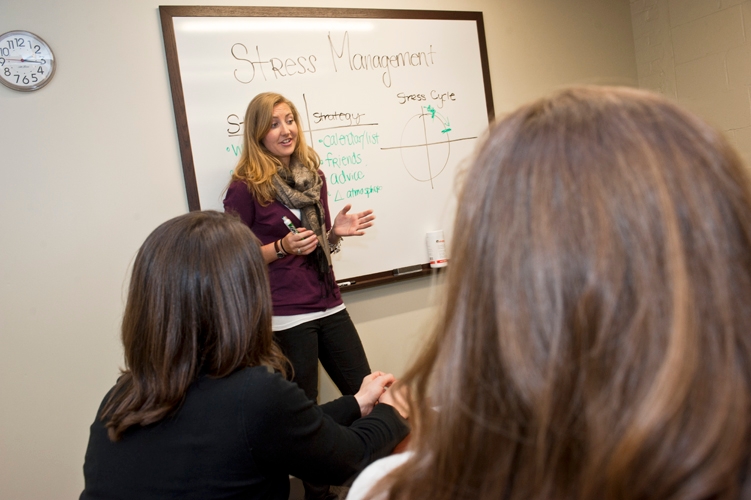
By
The Office of Health Promotion recently certified 34 health coaches to help bring their healthy living message to more BC students, with an additional 25 students being interviewed for possible inclusion on the health coach roster.
Developed by OHP Director Elise Tofias Phillips and her team, and launched this academic year, the health coach program offers health education on a peer-to-peer basis. Health coaches undergo intensive training in a number of specialty areas, such as stress management, nutrition, prevention of relationship violence, women’s health, bystander intervention, alcohol and drug education, sexual health and relationship management. Once trained, the students engage their peers in health-related conversations and help implement student-centered programming.
“We know through research that students who talk to other students are more motivated to make positive behavioral changes,” said Tofias Phillips of the coaching program. “This is a great way for students to help themselves with the aid of a peer mentor.
“Our coaches educate, motivate and refer peers to the help they need for a healthier lifestyle.”
According to Tofias Phillips, students interested in improving their overall health can meet one-on-one with their respective coach. The two will develop a personal health plan, set goals, and determine ways to change behaviors and make lower-risk choices.
“The ideal health coach is a student who is interested in health topics, motivated, and dedicated to the idea of helping other students meet their health goals,” she said. “This program has really tapped into students’ interests and provides them with a new way to become involved.”
Health coach Natalie Thomas ’12 agrees.
“When I heard about the Office of Health Promotion, I knew I wanted to get involved any way that I could. I am extremely interested in health and wellness and what it means to live out the Jesuit mission of developing the whole person, from balanced nutrition to being in a healthy relationship, and to the development of personal spirituality. The health coach program in particular offered the opportunity to explore these aspects of health and many more, as well as to educate my peers about what I had learned through training and about various resources available on campus.
“With the guidance of Elise, this program has not only given me a great foundational knowledge base in an array of health concerns,” Thomas says, “but also the active listening and communication skills that it requires to truly motivate my peers to live healthy lifestyles. These are skills I will carry with me for the rest of my life. I'm sad to graduate after only just starting the program but I am so excited to see the Office of Health Promotion take off in the coming years.”
Student involvement has been the cornerstone of the year-old Office of Health Promotion programming. Last year, the group developed “Healthapalooza,” a popular student health fair on O’Neill Plaza. Dozens of workshops, support groups, meditation sessions and conversations have taken place over the semester, and a “Spring Into Health” event is scheduled for April 30 on the Quad.
For more on Health Promotion programming, or to become a health coach, see www.bc.edu/healthpro



